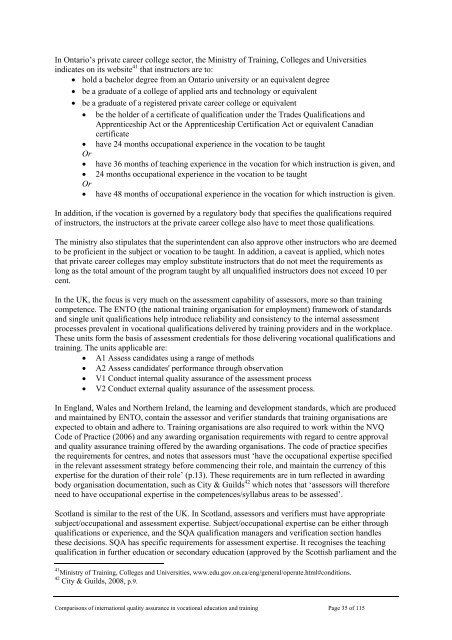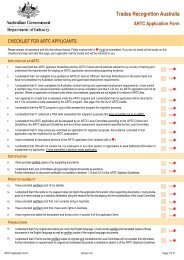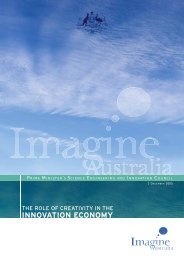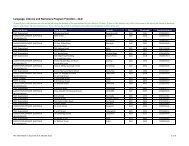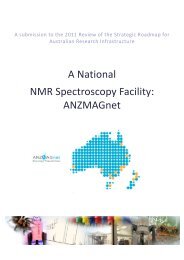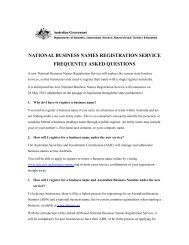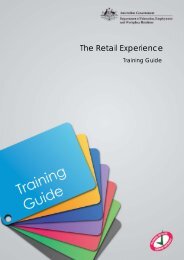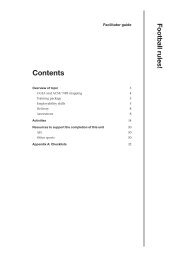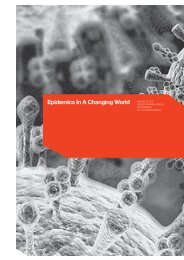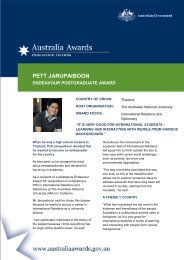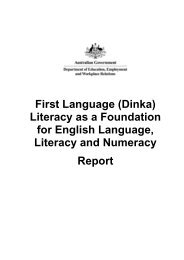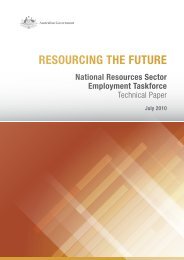Review - Department of Innovation, Industry, Science and Research
Review - Department of Innovation, Industry, Science and Research
Review - Department of Innovation, Industry, Science and Research
Create successful ePaper yourself
Turn your PDF publications into a flip-book with our unique Google optimized e-Paper software.
In Ontario’s private career college sector, the Ministry <strong>of</strong> Training, Colleges <strong>and</strong> Universities<br />
indicates on its website 41 that instructors are to:<br />
• hold a bachelor degree from an Ontario university or an equivalent degree<br />
• be a graduate <strong>of</strong> a college <strong>of</strong> applied arts <strong>and</strong> technology or equivalent<br />
• be a graduate <strong>of</strong> a registered private career college or equivalent<br />
• be the holder <strong>of</strong> a certificate <strong>of</strong> qualification under the Trades Qualifications <strong>and</strong><br />
Apprenticeship Act or the Apprenticeship Certification Act or equivalent Canadian<br />
certificate<br />
• have 24 months occupational experience in the vocation to be taught<br />
Or<br />
• have 36 months <strong>of</strong> teaching experience in the vocation for which instruction is given, <strong>and</strong><br />
• 24 months occupational experience in the vocation to be taught<br />
Or<br />
• have 48 months <strong>of</strong> occupational experience in the vocation for which instruction is given.<br />
In addition, if the vocation is governed by a regulatory body that specifies the qualifications required<br />
<strong>of</strong> instructors, the instructors at the private career college also have to meet those qualifications.<br />
The ministry also stipulates that the superintendent can also approve other instructors who are deemed<br />
to be pr<strong>of</strong>icient in the subject or vocation to be taught. In addition, a caveat is applied, which notes<br />
that private career colleges may employ substitute instructors that do not meet the requirements as<br />
long as the total amount <strong>of</strong> the program taught by all unqualified instructors does not exceed 10 per<br />
cent.<br />
In the UK, the focus is very much on the assessment capability <strong>of</strong> assessors, more so than training<br />
competence. The ENTO (the national training organisation for employment) framework <strong>of</strong> st<strong>and</strong>ards<br />
<strong>and</strong> single unit qualifications help introduce reliability <strong>and</strong> consistency to the internal assessment<br />
processes prevalent in vocational qualifications delivered by training providers <strong>and</strong> in the workplace.<br />
These units form the basis <strong>of</strong> assessment credentials for those delivering vocational qualifications <strong>and</strong><br />
training. The units applicable are:<br />
• A1 Assess c<strong>and</strong>idates using a range <strong>of</strong> methods<br />
• A2 Assess c<strong>and</strong>idates' performance through observation<br />
• V1 Conduct internal quality assurance <strong>of</strong> the assessment process<br />
• V2 Conduct external quality assurance <strong>of</strong> the assessment process.<br />
In Engl<strong>and</strong>, Wales <strong>and</strong> Northern Irel<strong>and</strong>, the learning <strong>and</strong> development st<strong>and</strong>ards, which are produced<br />
<strong>and</strong> maintained by ENTO, contain the assessor <strong>and</strong> verifier st<strong>and</strong>ards that training organisations are<br />
expected to obtain <strong>and</strong> adhere to. Training organisations are also required to work within the NVQ<br />
Code <strong>of</strong> Practice (2006) <strong>and</strong> any awarding organisation requirements with regard to centre approval<br />
<strong>and</strong> quality assurance training <strong>of</strong>fered by the awarding organisations. The code <strong>of</strong> practice specifies<br />
the requirements for centres, <strong>and</strong> notes that assessors must ‘have the occupational expertise specified<br />
in the relevant assessment strategy before commencing their role, <strong>and</strong> maintain the currency <strong>of</strong> this<br />
expertise for the duration <strong>of</strong> their role’ (p.13). These requirements are in turn reflected in awarding<br />
body organisation documentation, such as City & Guilds 42 which notes that ‘assessors will therefore<br />
need to have occupational expertise in the competences/syllabus areas to be assessed’.<br />
Scotl<strong>and</strong> is similar to the rest <strong>of</strong> the UK. In Scotl<strong>and</strong>, assessors <strong>and</strong> verifiers must have appropriate<br />
subject/occupational <strong>and</strong> assessment expertise. Subject/occupational expertise can be either through<br />
qualifications or experience, <strong>and</strong> the SQA qualification managers <strong>and</strong> verification section h<strong>and</strong>les<br />
these decisions. SQA has specific requirements for assessment expertise. It recognises the teaching<br />
qualification in further education or secondary education (approved by the Scottish parliament <strong>and</strong> the<br />
41 Ministry <strong>of</strong> Training, Colleges <strong>and</strong> Universities, www.edu.gov.on.ca/eng/general/operate.html#conditions.<br />
42 City & Guilds, 2008, p.9.<br />
Comparisons <strong>of</strong> international quality assurance in vocational education <strong>and</strong> training Page 35 <strong>of</strong> 115


